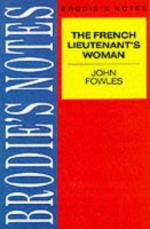|
This section contains 6,176 words (approx. 21 pages at 300 words per page) |

|
SOURCE: "John Fowles and the Fiction of Freedom," in The British and Irish Novel since 1960, edited by James Acheson, Macmillan Academic and Professional Ltd, 1991, pp. 62-77.
Butler is an educator, editor, and critic. In the essay below, he discusses Fowles's focus on freedom, Existentialism, Poststructuralism, and intertextuality in his novels.
Fowles is an engima in broad daylight. He is exceptionally open about his feelings and opinions, yet it is hard to be absolutely certain that one has understood his work or his position in post-1960s fiction. He is an erudite novelist who is at the same time immensely popular. He is obsessional about freedom and at the same time critical of the uses to which it has been put. Much of his work seems to have a left wing or feminist bias, yet he can also be seen as crypto-fascist and sexist. He is a self-proclaimed atheist...
|
This section contains 6,176 words (approx. 21 pages at 300 words per page) |

|


